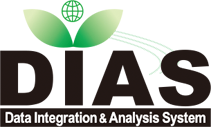Metadata in DIAS
The FAIR Principle and Metadata
The FAIR principle for research data is gaining increasing attention with the development of open science and data-driven research. "FAIR" is an acronym for the four words: Findable, Accessible, Interoperable, and Reusable. As it is becoming common to understand that data services should meet these four criteria at a high level, DIAS also recognizes the importance of increasing the value of data services, referring to the FAIR Principles.
Metadata is the critical information that makes data Findable. What is this data about, how and when was it obtained, who or what organization is responsible for it, what kind of pre-processing or post-processing has been added, and in what format is it provided? With this information, anyone can search, sort, and use the data. In other words, metadata is created not so much for the data creators and providers but for "others," the data users. DIAS provides the DIAS metadata management system to support metadata entry, and our data curators review the metadata to improve the findability of the data.
Furthermore, DIAS enhances data findability by sharing metadata with the following external services.
- First, by providing metadata created by DIAS to external services, external services can also find DIAS datasets.
- Second, by collecting metadata created besides DIAS, we make their datasets findable from the DIAS Dataset Search and Discovery system.
- Third, by utilizing the DIAS metadata infrastructure, it is possible to create metadata about external datasets besides DIAS and make them findable.
Thus, DIAS publishes metadata, the content linked to datasets, to the public in cooperation with data creators as an infrastructure for making various global environmental datasets findable.
Provision of DIAS metadata to external services
We will introduce three services as activities to make DIAS datasets findable by providing metadata created by DIAS to external services other than DIAS.
Providing metadata to the GEOSS Platform operated by the GEO
GEOSS (Global Earth Observation System) is an international initiative operated by GEO (Group on Earth Observations) to widely utilize earth observation data for solving social issues. The metadata collected by the GEOSS Platform can be searched on the GEOSS Portal, making the DIAS data set findable by the international research community.
Utilization of DOI (Digital Object Identifier)
There is a growing trend in open science to assign identifiers to all academic resources, including papers and datasets. In many academic fields, including DOIs in papers' citations to increase the sustainability of access has already become familiar. In the future, including the dataset DOIs in the citation will become more common. Including DOI in citations will play an essential role in visualizing the contributions of various research activities as citation relationships. Therefore, DIAS also actively assigns DOIs to datasets (in Japanese). To assign DataCite DOIs, DIAS provides DataCite with metadata on datasets for which the provider wishes to assign DOIs. This metadata is used in various services based on DOIs. Typical examples are research achievement management services such as ORCID, researchmap, and research achievement search services such as CiNii Research. In addition, DIAS is developing "Mahalo Button" as a service that utilizes DOIs and is expanding from understanding the status of dataset usage using DOIs to a service that visualizes the contribution of data creators.
Support for Google Dataset Search
Google's dataset search service works by embedding appropriate metadata in dataset publication pages. Google's crawlers read the pages, and the metadata is then included in the search engine. Since DIAS datasets are already searchable through Google Dataset Search, a wide range of use across fields is expected.
Licensing of Metadata
Finally, we want to discuss metadata licensing, which is crucial when providing metadata to external services. The external services mentioned above show that metadata is material for making datasets findable and that it is essential to guarantee the freedom of using metadata by external services. Therefore, DIAS licenses metadata under the Creative Commons License CC0. This license allows use under conditions as close as possible to the public domain. We hope this will lead to greater use of metadata. However, since the purpose of promoting the use of metadata is to make datasets findable, the licenses and conditions of use set by the data providers still apply to downloading datasets.
Collection of Metadata external to DIAS
DIAS operates a service in cooperation with the external service to collect metadata from external services, not only to provide external services. Currently, DIAS links with four services below:
You can search metadata collected from these services in the DIAS Search and Discovery system. The search results indicate that the dataset originates from the linked system, and a link to the source dataset publication page is displayed. If your institution is considering a new linkage, don't hesitate to contact DIAS.
DIAS Metadata Infrastructure Application Examples
In addition to the case of linking DIAS and external services so far, there has been a case where DIAS has become a base for providing metadata related to external datasets. DIAS has created and released metadata for the datasets created and managed in the projects listed in the "Action Plan for Earth Observation in Japan" compiled by MEXT.
In this way, the metadata infrastructure that DIAS has built thus far has many functions related to creating, collecting, and distributing metadata and can be used as a distribution center for metadata in the global environment field.
If you have any new requests for such various service linkages or utilization of the metadata infrastructure, please contact the DIAS Secretariat.
